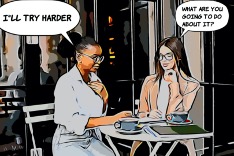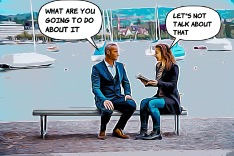You might be wondering what response you’re to give when someone asks what you’re going to do about a particular situation.
Your response will determine if you’re going to go ahead to do something or if nothing at all would be done.
This article will identify 30 expressions that are the best responses to the phrase “What are you going to do about it”.
A simple response is “Why do you want to know”, which is an inquiry as to why the person wants to know about your next move. You can also say “Nothing” to let someone know that you have no plans of doing anything.
Not satisfied? You can check out our list of responses here.
30 of Our Best Replies to “What Are You Going To Do About It”
- Why do you want to know?
- Nothing
- You wouldn’t want to know
- What will you do if I tell you
- Nothing that concerns you
- You’ll see
- You know already
- I don’t know yet
- Nothing because I don’t care
- A lot of things
- The right thing.
- I’ll try harder
- Nothing can be done
- I have no clue
- Let’s ask someone first
- Let’s not talk about that
- Is that supposed to be a question
- I’ll show you
- What should I do
- Wait and see
- You’d be surprised
- Whatever I want
- It depends on …
- Not sure
- I don’t know you. Why are you interested?
- Leave that to me
- Didn’t know you’d ask
- I’ll try something new
- I didn’t know I’d need to do something
- I told you already
Why do you want to know?
This is a question that is being asked to know why someone needs information. You’re asking a person why they want to have an idea of what you’re going to do.
This shows that you don’t want the person to know what you’re going to do. This inquiry aims to determine the reason behind the requirement for your plan.
You’re questioning someone who wants to know what you’re going to do. This shows your want to keep your plans from the other person.
Nothing
This is a straightforward answer. It simply tells that you won’t do anything about it. It implies that you don’t want to do anything about it or you don’t have plans of doing anything about it.
It’s a negative answer to a particular situation. This shows that you don’t want to take any action toward a particular situation.
That only suggests that you won’t take any action or that you are unwilling to take action. It is a response that shows that you don’t have any intentions to do anything.
This expresses your desire to do nothing about a certain problem.
You wouldn’t want to know
When you respond in this manner, you’re telling someone that they won’t like to know what you’ll do. This shows that you don’t want them to know. It implies that you don’t want them to have any idea of what you’ll do.
By responding in this way, you are letting the other person know that they won’t like to find out what you’re about to do. This expresses your desire for them to remain unaware.
What will you do if I tell you?
Here also, you’re questioning the person’s ability. You want to know what action the person would take if you tell them what you have in mind to do.
You don’t mind telling someone what you’ll do about it but on the condition that the person tells you first what they’ll do. In this instance as well, you cast doubt on their competence.
If you share your plans with someone, you want to know what course of action they would take. If someone tells you what they’re going to do first, you don’t mind telling them what you’re going to do about it.
Nothing that concerns you
Here, you’re letting the person know that what you’re going to do about something does not concern them.
You’re letting the person know that they don’t need to know what you’re going to do because it doesn’t affect them.
You’re telling the person that what you’re going to do in this situation doesn’t affect them. By saying that they don’t need to know what you’re about to do since it won’t affect them, you’re letting the individual know that their opinion may not be needed.
You’ll see

By saying “you’ll see”, you’re telling someone to be patient to know what you’re going to do. you’re telling the person to wait and watch what you’re going to do.
This implies that you’re truly going to do something, even though you do not disclose what you’re going to do to the speaker.
When you say “you’ll see,” you’re urging the other person to wait until you do what you say you’re going to do. You’re requesting that they wait and observe what you’re about to accomplish.
You know already
This response shows that the person already has a clue of what you’re going to do. it means that the person knows what you’re going to do at the moment.
It shows that before that time, the person already knows what you’re going to do. By giving this reaction, you may tell that the other person is already aware of what you’re going to do.
Thus, it implies that the other person is aware of your current plans.
I don’t know yet
This response means that you don’t know what you’re going to do right now. It means you’re going to know probably in the future.
Though you expect to know what to do about something later at the moment, you do not know. It shows that you have no idea of what to do now but you’re sure of knowing later.
Your response indicates that you are currently unsure about your next steps. That implies that you will probably find out in the future.
Even when you anticipate knowing what to do about something tomorrow, you are unsure right now. It implies that while you are unsure of what to do right now, you will know for sure in the future.
Nothing because I don’t care
This is another negative statement that shows you won’t do anything about it. It shows you have no plans of doing anything.
This expression also states the reason why you won’t do something. It implies that you’re not going to take any action about a certain thing because you don’t care about it.
This simply means that something is of less importance to you, so you won’t take any action for it. It demonstrates that you are unmotivated to take action.
Also, this phrase explains why you won’t do anything. It suggests that you don’t care about anything enough to take any action in response to it.
This only indicates that something is less important to you, and as a result, you won’t do anything about it.
A lot of things
By saying this, you’re simply telling the speaker what you’ll do. You’re letting the speaker know that you have plans of doing something.
It means you’re going to do so many things regarding a particular situation. It’s not a negative statement as it shows that you have so many things in mind to do.
You are only informing the speaker of your plans by stating this. You are announcing to the speaker that you intend to accomplish something.
It implies that there are a lot of things you’ll perform under certain circumstances.
The right thing
This response also shows that you have plans of doing something. In this case, what you hope or want to do I nothing but what is right. So if you’re going to act, then it has to be the right thing.
This comment also demonstrates that you have intentions to take action. Anything you hope or want to do in this situation is just the proper thing.
Hence, if you’re going to do something, it needs to be the proper thing.
I’ll try harder

This response shows that you’ll put in a better effort than you did the last time. This implies that the action you took the first time wasn’t good enough, and in response to the speaker’s question, you’ll do better this time.
With your reaction, you’ve demonstrated that you’ll work harder than you did previously. This suggests that the action you did the previous time wasn’t adequate or enough and that this time, in answer to the speaker’s query, you’ll do better.
Nothing can be done
This reply is a conclusion that you can’t do anything about it. This may be a result of a situation whereby you’ve tried every means possible but it yielded no solution.
You can use this reply when you’ve tried your best in doing something. This response implies that there is nothing you can do about it.
This might be the outcome of a circumstance where you tried every option but there was still no resolution. After you’ve put your best effort into anything, you can respond like this.
I have no clue
This statement shows that you don’t know what you’ll do about a particular situation. In this case, you have no idea how to even start tackling the issue.
This implies that there’s a high chance of you not doing anything about it because you don’t know exactly how to start.
This expression shows that you are unsure of how you will handle a specific circumstance. You don’t even know where to begin in this situation to solve the problem.
This suggests that there is a strong likelihood that you won’t take action since you are unsure of where to begin.
Let’s ask someone first
Since you have no clue how to go about it, you’re deciding to ask another person. This response shows that you want to hear the opinion of someone else.
You want to hear from another person before you decide what to do about a particular situation. You’re choosing to ask someone else since you have no idea how to go about doing it.
Your comment demonstrates that you are interested in other people’s perspectives. When deciding what to do in certain circumstances, you want to hear what another person has to say.
Let’s not talk about that

This reply shows that you’re not interested in talking about a particular situation. It may be that you already know what you’re going to do but you don’t want to talk about it.
It may be that you’re too occupied to have that conversation.
Is that supposed to be a question?
This statement shows that you don’t expect that to be a question. This means you’re obviously going to do something about a situation, so you don’t expect the speaker to ask you.
I’ll show you
This response implies that you’ll do something. With this statement, not only will you do something, but you’ll like the speaker to witness it.
You’re letting the person know that they’ll see what you’ll do and you’ll like to show them also. This reaction suggests that you’ll take action.
With this phrase, you’ll not only take action but also want the speaker to see it. You’re telling the individual that you want to show them as well as what you’ll do.
What should I do?
Here, you have no clue what to do. You’re asking someone else what you should do about a particular situation. You’re seeking someone’s opinion and idea on something that you’re probably confused about.
Wait and see
Here, you’re telling the person to hold on and see what you’ll do about it. This simply means you already know what to do but you don’t want to say it, instead, you want the person to see it.
You’d be surprised
This statement shows that the speaker would be taken aback by what you plan to do. What you plan to do would be seen as a surprise to the speaker. You’re telling the speaker that they’ll be amazed by what you’ll do.
Whatever I want
With this response, you’re letting the speaker know that you’ll do whatever pleases you. You don’t have a particular plan but you’ll do what you want.
It depends on …
This statement shows that what you’ll do about a situation depends on something else. Here, you’re considering your actions based on certain things.
This implies that whatever you’re going to do or whatever action you’ll take would be based on certain things.
Not sure
This reply shows that you’re not certain about what you’re going to do. in this reply, there’s a little form of doubt, because you’re not certain of your decision.
It could be that you’re still considering some things before you take any action.
I don’t know you. Why are you interested?
By saying this, you’re letting the speaker know that you have no idea who the person is. You’re also wondering why the person would have an interest in what you’re going to do.
This statement comes as a surprise because you didn’t expect a stranger to ask you a such question.
Leave that to me
This response shows that you can handle the situation yourself. By saying this, you don’t want the speaker to worry much about you. It shows that you have everything under control and would know what to do about it.
Didn’t know you’d ask
This expression shows that you were not expecting the person to ask you what you’ll do. It shows surprise at what someone had said.
This response doesn’t answer the question, it doesn’t say if you’d do something or not. It simply shows surprise.
I’ll try something new
You’re letting the speaker know that the only thing you can do about it is to try something new. It shows that you want to try something else to see if you’ll get successful.
It implies that you have plans of doing things differently from the way you did at first.
I didn’t know I’d need to do something
This response implies that you had no idea that you should do something about it. It shows that you’re just getting to know that you’re meant to do something about it from the speaker.
I told you already
When you use this response, you’re simply reminding the speaker of what has been said or discussed earlier.
It implies that you’ve earlier told the speaker about what you plan to do.
This shows that you and the speaker have had a conversation about you doing something before.
Conclusion
We have carefully examined each of the 30 responses and what they mean. These responses can be used both formally and informally.
Whatever response you give would determine how the rest of the conversation would go.